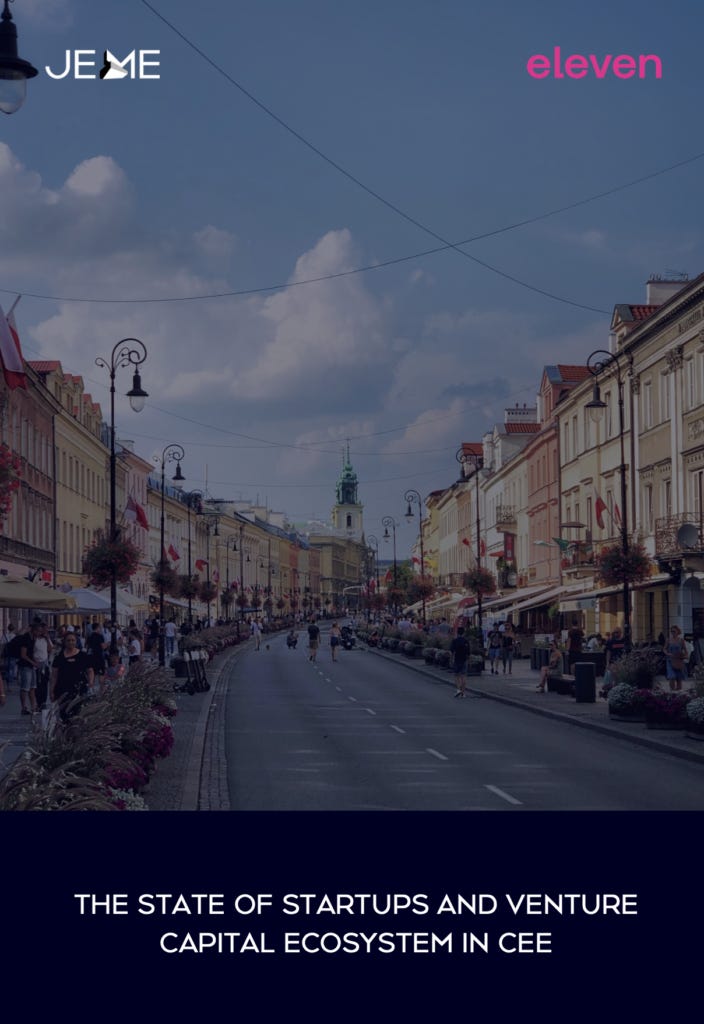Over the past few years, Central and Eastern Europe (CEE) has quietly built itself into one of the most promising, underappreciated startup ecosystems in the world. Now, thanks to a landmark report co-authored by Eleven Ventures and JEME Bocconi — one of the most respected student-run consultancy groups in Europe — we have the data and insight to back that claim.
This 60-page deep dive outlines how the region, long seen as a talent hub for Western tech giants, is now creating its own.
A Region on the Rise
The numbers tell a compelling story:
€213 billion in combined enterprise value across 26,000+ startups, up 2.4x since 2019.
52 unicorns have emerged from the region, with Poland, Estonia, and the Czech Republic leading the charge.
Despite global VC contraction, CEE funding fell just 15% in 2023, vs. 35% in Western Europe — a signal of remarkable resilience.
The economic foundation is strong, too. CEE’s GDP is expected to grow at 3.0% in 2025, outpacing the Eurozone’s 1.1%, driven by factors like:
Deep technical talent pools (1.3M+ software developers),
Low labor costs (Bulgaria: €9.3/hr vs EU avg: €31.8),
High capital efficiency and early profitability.
Talent, Tech, and Thrift
The report captures what makes the CEE special: it’s cost-efficient, technically gifted, and deeply pragmatic.
CEE founders tend to focus on fundamentals — early revenue, profitability, and lean scaling. This ethos, forged in capital-constrained environments, delivers results: 40 jobs per €1M invested, compared to 25 in the rest of Europe.
CEE’s sweet spots:
Enterprise Software (leading sector by value: €80B)
AI (45% of Q1 2024 VC investment)
Climate Tech (26% of investment, riding the energy transition wave).
Poland & Czech Republic: Ecosystems to Watch
Poland:
Home to 13 unicorns, 5,773 startups, and €49B in enterprise value.
Leading the AI movement with 23.4% of all CEE AI startups.
Strong public-private partnership via PFR Ventures and national AI initiatives.
Massive domestic VC presence (147 funds), with expanding international interest.
Czech Republic:
Punching above its weight with €23B in startup value.
Renowned for cybersecurity (Avast), gaming (135+ studios), and now AR/VR.
Backed by programs like CzechInvest and RRF Funds, with a focus on sustainability and cross-border collaboration.
The VC Landscape: Early-Stage Driven, Public-Funding Reliant
A standout insight: 92% of VC deals in CEE are pre-seed or seed — a radically different profile from Western Europe’s later-stage focus.
However, 34% of CEE startup capital in 2023 was public money, and many VC funds remain reliant on EU-backed programs. As these funds start to sunset, there's a real question of how — or if — the private sector will step in to fill the gap.
Still, international LP appetite is growing: foreign investor share grew from 9% in 2022 to 21% in 2023. New funds are forming, particularly around ESG, AI, and sustainability themes.
A Few Challenges Ahead
It’s not all smooth sailing:
Limited late-stage capital keeps many startups from scaling locally.
Brain drain and HQ relocations (e.g., to the US or UK) are still common.
Misalignment between founders and investors — particularly around growth expectations and risk tolerance — remains a cultural hurdle.
But the energy is undeniable. This is a region still in the early innings of what could be a breakout decade.
📌 Why This Matters for You
If you’re an investor, CEE offers access to highly efficient startups, underpriced deals, and technical founders who know how to stretch a dollar.
If you’re a founder, it’s a region where innovation is growing fast — and being increasingly noticed by the world.
This report is more than just a survey of startup activity — it’s a call to reframe how we think about the geography of innovation in Europe. CEE isn’t an “emerging” region anymore. It’s here. It’s growing. And it’s worth betting on.




Emerging Europe is where it's at, and Turkey is the biggest player in the region, helping to pull the market forward.